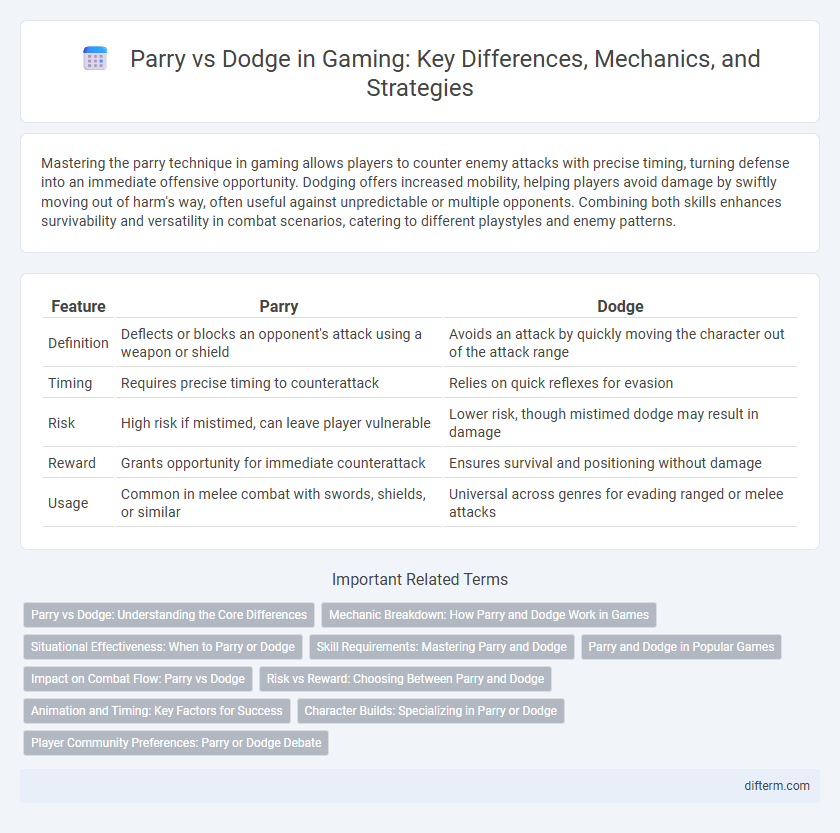Mastering the parry technique in gaming allows players to counter enemy attacks with precise timing, turning defense into an immediate offensive opportunity. Dodging offers increased mobility, helping players avoid damage by swiftly moving out of harm's way, often useful against unpredictable or multiple opponents. Combining both skills enhances survivability and versatility in combat scenarios, catering to different playstyles and enemy patterns.
Table of Comparison
| Feature | Parry | Dodge |
|---|---|---|
| Definition | Deflects or blocks an opponent's attack using a weapon or shield | Avoids an attack by quickly moving the character out of the attack range |
| Timing | Requires precise timing to counterattack | Relies on quick reflexes for evasion |
| Risk | High risk if mistimed, can leave player vulnerable | Lower risk, though mistimed dodge may result in damage |
| Reward | Grants opportunity for immediate counterattack | Ensures survival and positioning without damage |
| Usage | Common in melee combat with swords, shields, or similar | Universal across genres for evading ranged or melee attacks |
Parry vs Dodge: Understanding the Core Differences
Parry and dodge serve distinct roles in gaming combat mechanics, with parry requiring precise timing to deflect an opponent's attack, often leaving them vulnerable to counterattacks. Dodge emphasizes evasion by quickly moving out of the attack's trajectory, enhancing survivability without engaging directly. Mastering the core differences between parry and dodge enables players to adapt their defensive strategies based on the game's pacing and enemy behavior.
Mechanic Breakdown: How Parry and Dodge Work in Games
Parry mechanics involve precise timing to deflect or counter an opponent's attack, often leaving the attacker vulnerable for a brief window, enhancing strategic combat depth. Dodge mechanics require players to quickly move their character out of harm's way, emphasizing agility and positioning to avoid damage altogether. Both systems demand skillful execution but cater to different playstyles: parrying rewards precision and timing, while dodging focuses on movement and spatial awareness.
Situational Effectiveness: When to Parry or Dodge
Parrying excels in close-quarters combat where precise timing can deflect enemy attacks and create counterattack opportunities, especially against predictable or slow weapons. Dodging offers greater flexibility in situations involving multiple foes or fast, unpredictable strikes by enabling quick repositioning and evasion without committing to a single defensive action. Effective gameplay balances parry and dodge use based on enemy attack patterns, weapon speed, and spatial environment to maximize survivability and offensive potential.
Skill Requirements: Mastering Parry and Dodge
Mastering parry demands precise timing and deep understanding of enemy attack patterns, requiring players to anticipate moves and react within tight windows. Dodge proficiency relies on agility and spatial awareness, enabling players to quickly reposition and avoid damage while maintaining offensive opportunities. Combining both skills enhances survivability and combat effectiveness in challenging gaming environments.
Parry and Dodge in Popular Games
In popular games like Dark Souls and Sekiro, parrying demands precise timing to deflect enemy attacks, often leaving foes vulnerable to critical counterattacks. Dodge mechanics in titles such as The Legend of Zelda: Breath of the Wild and Monster Hunter enable players to evade damage by quickly moving out of harm's way, emphasizing agility and positioning. Parrying typically rewards skillful players with immediate offensive advantages, whereas dodging offers defensive flexibility across a broader range of combat scenarios.
Impact on Combat Flow: Parry vs Dodge
Parry and dodge play distinct roles in combat flow, with parry emphasizing precise timing to block and counter enemy attacks, creating opportunities for immediate retaliation. Dodge enhances mobility by allowing players to evade damage, maintaining offensive pressure without the risk of stamina depletion associated with parrying. Mastery of both techniques optimizes combat efficiency, balancing defense and aggression for a dynamic gameplay experience.
Risk vs Reward: Choosing Between Parry and Dodge
Parrying in gaming offers a high-risk, high-reward approach by requiring precise timing to counter attacks and create openings for powerful counterattacks, while failure often results in taking significant damage. Dodging provides a safer defensive option with greater mobility and evasion, allowing players to avoid damage more consistently but generally offers fewer offensive opportunities. Players must balance the risk of parrying's timing with the reliability of dodging to optimize survival and damage output in fast-paced combat scenarios.
Animation and Timing: Key Factors for Success
Parry and dodge mechanics rely heavily on precise animation cues and impeccable timing to maximize defensive effectiveness in gaming. Parrying requires players to recognize the opponent's attack animation and input the counterattack at the exact moment, often within a narrow frame window, while dodging depends on timing the evasive movement to avoid damage entirely. Mastery of these techniques enhances survivability and strategic advantage in fast-paced combat scenarios.
Character Builds: Specializing in Parry or Dodge
Character builds specializing in parry emphasize timing and precision, enhancing armor and stamina regeneration to maximize counterattack potential. Dodge-focused builds prioritize agility and speed, investing in evasion stats and lightweight gear to increase mobility and avoid damage. Balancing these attributes depends on playstyle preferences, with parry builds favoring calculated defense and dodge builds excelling in quick, reactive maneuvers.
Player Community Preferences: Parry or Dodge Debate
Player communities often debate the effectiveness of parry versus dodge mechanics in gaming, weighing precision timing against evasive agility. Parry appeals to players who favor skill-based, risk-reward combat, rewarding exact input and timing for counterattacks. Dodge, preferred by those who prioritize fluid movement and avoidance, offers consistent defensive utility with fewer risks, shaping diverse playstyles within gaming communities.
Parry vs Dodge Infographic

 difterm.com
difterm.com